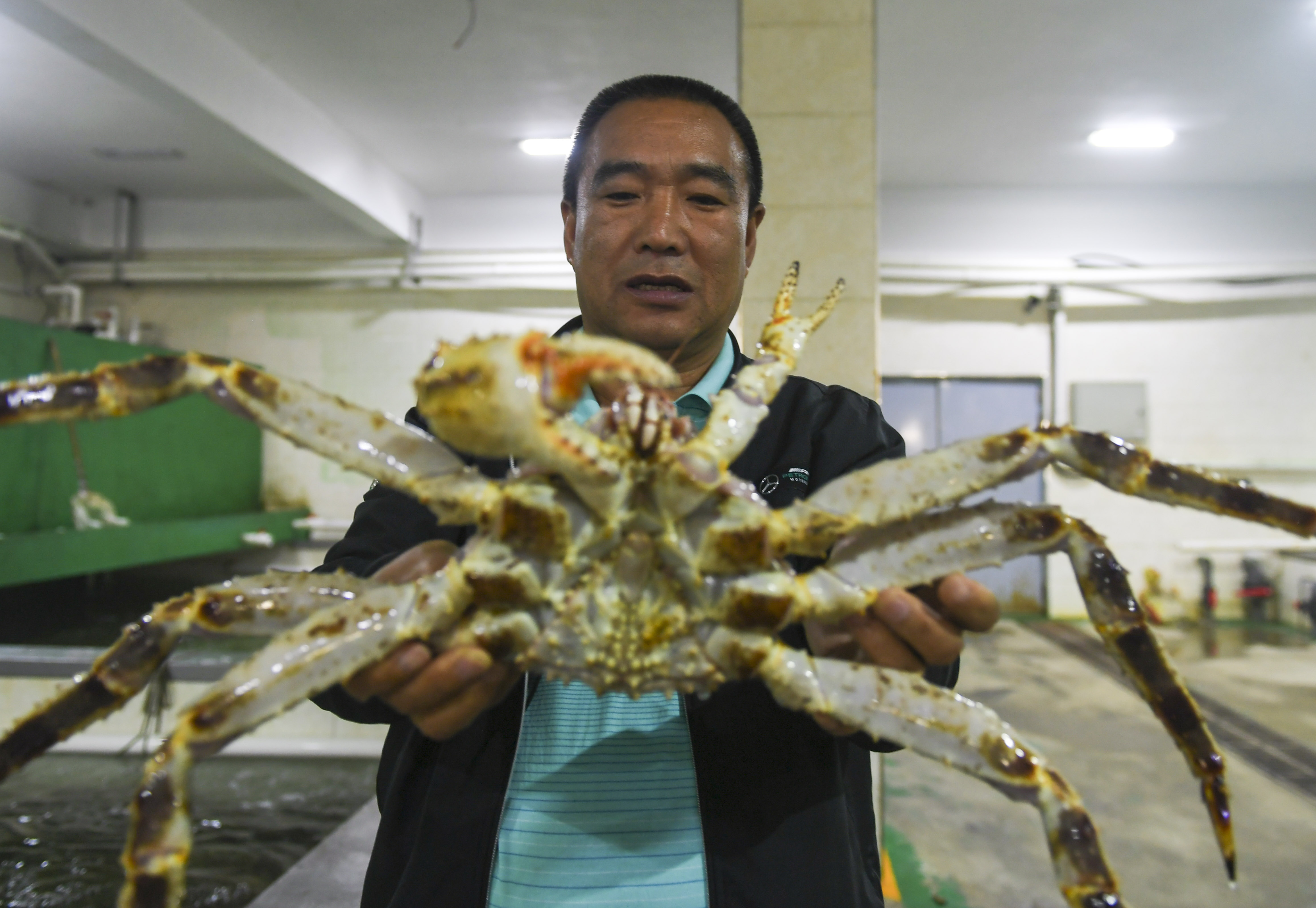CHANGCHUN, July 12 (Xinhua) -- For most Russian king crabs, ending up on dining tables in Chinese homes seemed distant, both geographically and in practice. But now they have to submit to their fate.
China imported a whopping 10,000 tonnes of king crabs last year, half of which entered the country through Hunchun, a Chinese city that borders Russia.
The Russian king crab, also known as the Kamchatka crab, used to be a luxury for Chinese consumers. It took about half a month for them to arrive in China, all the way from the Kamchatka Peninsula in Russia, Busan in the Republic of Korea (ROK) to major Chinese ports before being transported to other cities.

A customer holds a king crab at a seafood retail store in Hunchun, northeast China's Jilin Province, June 23, 2019. (Xinhua/Xu Chang)
"Fresh king crabs were almost non-existent in China," said Wang Jindong, 55, who entered the king crab business in 2015. He used to travel between the two countries and tried all kinds of transportation means to bring seafood to China.
After the launch of the Kamchatka-Zarubino-Hunchun air route in 2016, which makes Russian king crab transportation more stable and time-saving at a lower cost, Wang based his business in Hunchun permanently.
"I import the crabs via the air route nowadays, sometimes as many as over 50 tonnes a day, all selling out as soon as they land," Wang said.
He has set up offices in other places including Hong Kong and Taipei, even expanded his business to Thailand and other Southeast Asian countries.
"It only takes five days at most for someone in Shanghai to have a bite of fresh king crab," he added.

Wang Jindong, manager of Hehe Seafood Company, observes a king crab in Hunchun's International Seafood Industrial Park, northeast China's Jilin Province, June 22, 2019. (Xinhua/Xu Chang)
While the crab is getting fresher, its price is becoming more wallet-friendly. Wang said a kilo used to be priced at over 600 yuan (nearly 90 U.S. dollars), now just a little over 200 yuan.
Hunchun's booming trade of seafood is also drawing Russian businesspeople to the border city, some of them even speaking fluent Chinese with a local accent.
A freight train linking Zarubino and Hunchun will open soon. The idea that more crabs will arrive in China by train has excited people like Gregory, a representative of a fishing company in Russia.
"Instead of trucks, trains of crabs will open much more possibilities for the business." He expected to close a big deal with Wang.

Staff members unload king crabs from a truck transporting Russian seafood in Hunchun's International Seafood Industrial Park, northeast China's Jilin Province, June 22, 2019. (Xinhua/Xu Chang)
Hunchun has four road and railway ports at the national level, surrounded by a dozen Russian and DPRK ports. A new comprehensive bonded zone was established in Hunchun this March, a step forward to develop the city into a regional logistics hub in northeast Asia for high-end warehousing, supply chain management, smart logistics distribution and transaction settlement.
Hunchun International Seafood Industrial Park is home to nearly 200 seafood processing and trading companies as well as over 400 individual traders in the field. Last year, the city's total seafood trade volume stood at about 2.2 billion yuan, and the seafood processing industry achieved an output of 9 billion yuan.

A staff member measures the temperature of a storage pond for king crabs in Hunchun's International Seafood Industrial Park, northeast China's Jilin Province, June 22, 2019. (Xinhua/Xu Chang)
The border city is opening wider as China and Russia agreed to carry out the Northern Sea Route cooperation and jointly build the Polar Silk Road in 2017.
Trade volume between Hunchun and Russia was 4.61 billion yuan last year, up 90.1 percent year on year.
Besides king crabs, other seafood, chocolate, biscuits and milk products from Russia are gaining popularity in China. Digital products and garment manufactured in China are also welcomed in Russia.
"The fresh Russian king crab not only enriches China's consumer market but also demonstrates an ever-intensifying border trade cooperation between the two countries," said Quan Guinan, foreign trade head of Hunchun's commerce bureau. Enditem
Writers: Cao Bin, Zhao Jiasong, Zhang Jian, Shao Meiqi and Zhao Dandan.
Video editors: Luo Hui, Wang Haofei, Zhao Dandan, Xu Chang, Jiang Mingming



